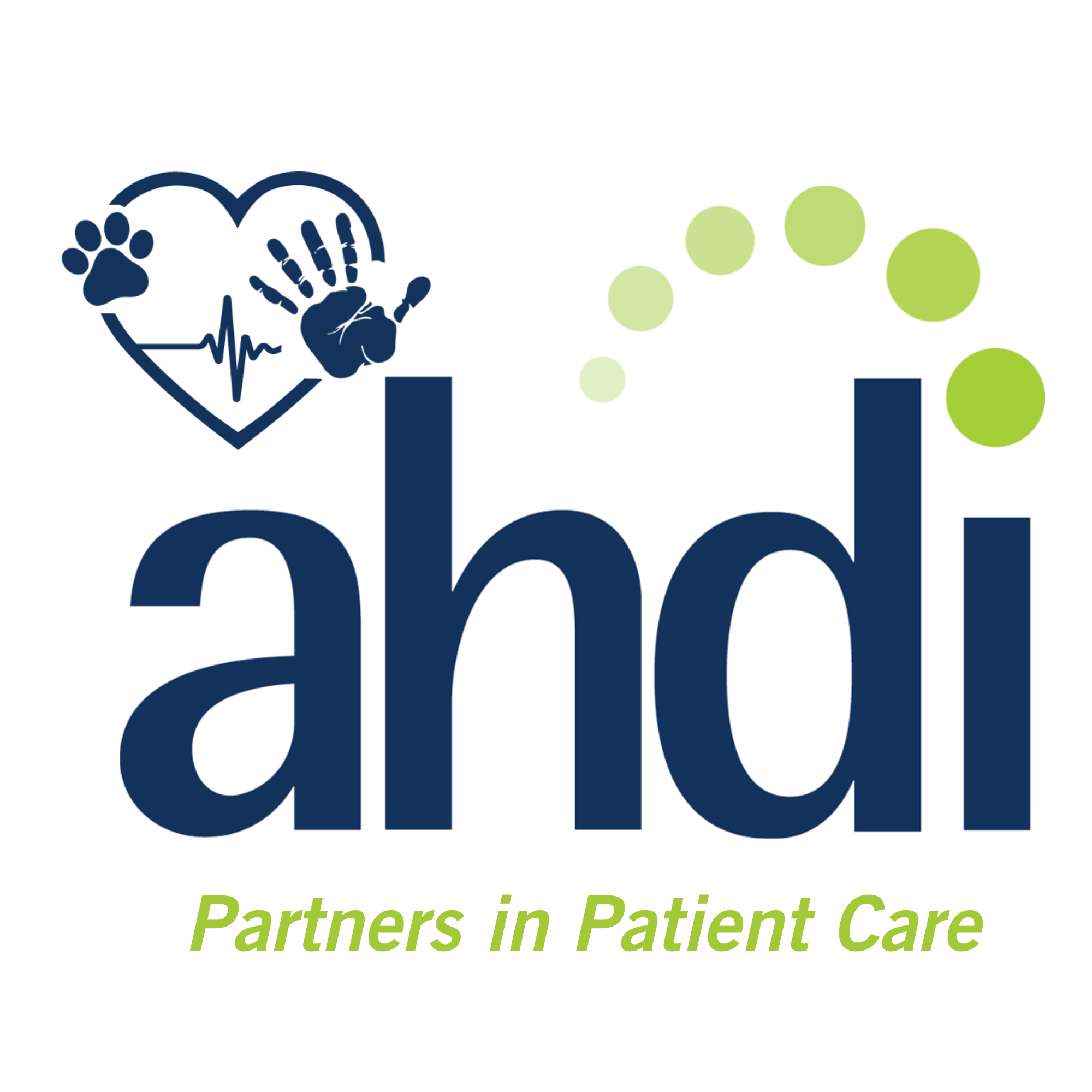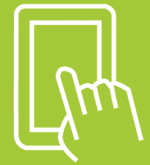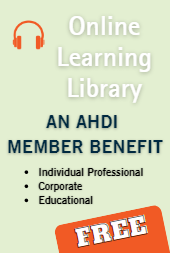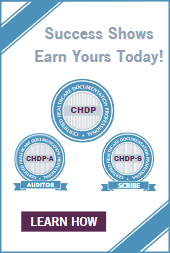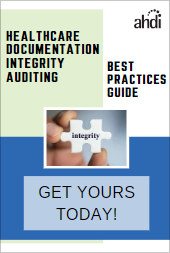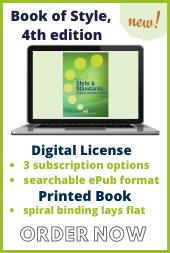HDS Frequently Asked Questions
What does a healthcare documentation specialist do?
Healthcare Documentation Specialists (HDSs), formeraly Medical transcriptionists (MTs) are specialists in medical language and healthcare documentation. They interpret and document dictation by physicians and other healthcare professionals regarding patient assessment, workup, therapeutic procedures, clinical course, diagnosis, prognosis, etc., editing dictated material for grammar and clarity as necessary and appropriate.
The process of healthcare documentation may involve editing text that has been produced by speech recognition. This requires listening to dictation while reading a draft created via speech recognition technology and editing the text on a computer screen. This editing may range from minimal to extensive, depending on the capabilities of the speech recognition software and the dictating habits of the originator, and may include correction of content as well as punctuation, grammar, and style.
What characteristics do I need in order to become a healthcare documentation specialist?
You need excellent English grammar skills, as well as a strong interest in and knowledge of the medical language. You need good visual and auditory ability and excellent listening skills. You need reasonable keyboarding skills and must be able to work for long hours, often in a high-pressure environment. A high level of concentration for extended periods of time is also important.
Where do healthcare documentation specialist work?
Medical transcriptionists work in hospitals, clinics, physician offices, transcription services, insurance companies, home healthcare agencies, and other locations where dictation for the purpose of healthcare documentation requires transcription. Many MTs work from their homes as independent contractors, subcontractors, or home-based employees.
How will speech recognition technology affect the future of medical transcription?
The amount of healthcare provider dictation continues to increase. However, the availability of qualified HDSs is not growing at the same rate. Speech recognition technology is sometimes used to compensate for the shortage of HDSs, but it is impossible for this technology, with all of its limitations, to completely eliminate the need for healthcare documentation specialist. Even at its best, machine-generated text contains errors that need to be corrected by professionals with language skills and an understanding of the health record. HDSs continue to be the best qualified to discern the nuances of human speech.
Is transcription being sent to overseas companies?
The offshoring of medical transcription exists because of the shortage of qualified HDSs in the United States, as well as rapidly escalating healthcare costs. However, only a very small percentage of the healthcare dictation generated in the U.S. is being sent offshore. HDSs can best protect their jobs in the U.S. by increasing their skills through continuing education and quality documentation.
How long will it take me to become a medical transcriptionist?
AHDI’s Model Curriculum for Healthcare Documentation, used by educators in developing their programs, recommends a two-year program that includes a minimum of 100 transcription hours in an externship program or simulated professional practice setting, emphasizing a variety of healthcare documents. Some schools offer shorter programs. However, medical transcription is a medical language and healthcare documentation specialty, not a keyboarding specialty, and intensive study is needed to acquire a high level of fluency in the medical language. Remember, you are gaining knowledge that will translate into a lifetime career!
Where can I learn healthcare documentation?
Programs that teach medical transcription can be found in community colleges, proprietary schools, and vocational-technical schools. There are also a number of online home-study programs which can be found by doing an Internet search.
AHDI advises that you look for programs that allow for interaction between instructors and students and provide opportunities for networking among students. Many classroom and online programs include this feature. This will better prepare you for the real world of healthcare documentation and for getting your first job in the field.
AHDI’s companion paper, Choosing An MT/HDS School, is designed to assist you in evaluating any programs you may be considering. We recommend that you look for programs that emphasize excellence in transcription/documentation, rather than focusing their advertising on medical transcription/healthcare documentation as a work-at-home opportunity. While it may be possible for you to do healthcare documentation from your home, the desire to work at home should not be your primary reason for entering this profession.
We advise you to carefully evaluate claims or promises made to you by any school with regard to future employability or job placement assistance.
Does AHDI accredit healthcare documentation programs?
AHDI has an education program approval process which is not the same as accreditation. A school may be accredited by an accrediting body, such as the Northwest Commission on Colleges and Universities (NWCCU), but HDS programs are not accredited. AHDI approves HDS programs through the Approval Committee for Certificate Programs (ACCP). Schools submit their applications for approval; and as programs complete successful evaluation, the names of those programs are placed on a listing of approved schools. This provides valuable information for prospective healthcare documentation students.
The current list of approved programs can be found here.
More information about the education program approval process can be found here.
Can I transfer my court-reporting skills to healthcare documentation?
With additional education and a shift in orientation, yes. The chief difference between court reporting and medical transcription is in the editing. HDSs edit when necessary and appropriate for grammar and for clarity, whereas court reporters usually record what is said verbatim. In addition, the medical terminology learned in a court-reporting school is seldom sufficient to satisfy the profession-specific demands of medical documentation. Anatomy and physiology, more advanced terminology, medical transcription practice, and additional English grammar and punctuation may be necessary. With this additional training, many court reporters are successful in transferring their skills to document medical records. In fact, use of the steno machine may facilitate productivity, a significant factor in many documentation environments.
I have already been trained in another medical field. Why do I need further training?
Learning how to listen with discrimination requires practice and guidance from an experienced helthcare documentation instructor. If you already have the requisite keyboard skills, the additional courses you need will include many hours of medical documentation practice. You probably have a head start, but you will need to learn how to integrate your medical knowledge with keyboarding and listening skills.
Does AHDI provide a healthcare documentation course?
AHDI is the membership organization for the healthcare documentation profession. Although we do not have an entry-level training program in healthcare documentation, we have developed the Model Curriculum for healthcre documentation, which educators use in developing educational programs. We also offer a variety of products for the classroom and independent study. In addition, the Book of Style & Standards for Clinical Documentation, 4th edition, is considered the gold standard in the industry.
Will I be a certified healthcare documentation specialist (CHDS) when I finish school?
While completion of a healthcare documentation course may entitle you to a diploma or a certificate of completion from the school you attend, this is not equivalent to the recognized professional designation of Certified Healthcare Documentation Specialist (CHDS) or a Registered Healthcare Documentation Specialist (RHDS). These credentials can be achieved only by passing the certification examination administered by AHDI. An individual can apply to sit for the RHDS exam upon completion of school. Only healthcare documentation specialists/medical transcriptionists with at least two years of experience in acute-care transcription are considered qualified to sit for the CHDS exam. To retain either credential, an individual must meet recertification requirements that include continuing education.
Why should I become certified?
While you are not currently required to become credentialed in order to work as a healthcare documentation specialist, earning the credential demonstrates to employers and peers that you are a professional and committed to being the best you can be. Certification also serves the public interest by assuring that those who become certified have met accepted standards of practice. Certification elevates the profession as well as the individual. Many employers prefer to hire—and pay a premium for—RHDSs and CHDSs, and many require the credential for career advancement.
Will it be easy for me to get a job?
Many new HDSs find it very difficult to get their first job in healthcare documentation. Production demands may prevent hospitals and transcription services from hiring inexperienced people. We recommend that you investigate the job market BEFORE you choose the career and invest in the education. Seek interviews with potential employers to ask what they expect of a beginning HDS and how likely they are to hire a recent graduate. Sometimes a small physician office or local transcription service will hire a beginner.
Some educational programs advertise that jobs are plentiful in the healthcare documentation field, particularly for those wishing to work at home. Look closely at all claims regarding availability of jobs, as many employers, particularly those who hire home-based HDSs, require experience. A few healthcare documentation educational programs offer job placement assistance. This can be an invaluable tool for helping you make contacts in the industry.
First do the research, then get a good education, and then be creative and persistent. Student membership in AHDI at both the local and national levels will help you stay informed and make connections.
Can I do healthcare documentation at home?
More and more employers are allowing their experienced HDSs to work from home. However, many will require you to work at their facility or in their office before sending you home to work on your own. The home transcriptionist/healthcare documentation specialist needs an excellent knowledge of the medical language, as well as the English language, and may have to make a substantial investment in reference materials and equipment. Those who provide the highest quality transcription are most likely to be successful.
How can I become a self-employed healthcare documentation specialist?
The independent healthcare documentation specialist should have an excellent knowledge of not only the medical language and the English language, but the language of business as well. You should be willing to make a substantial investment in medical reference materials and equipment. The successful independent HDS will maintain a high level of quality. Federal regulations call for special security precautions when dealing with protected patient information; this may involve some expense on your part. We also caution you that the IRS has specific regulations about home businesses and independent contractors. Be sure to seek the advice of a qualified attorney and/or tax advisor.
Also see the AHDI page, Tip Sheet for Becoming a Self-Employed Medical Transcriptionist/Healthcare Documentation Specialist.
How are healthcare documentation specialist paid?
Healthcare documentation specialist may be paid in any of a variety of ways, but chiefly by the hour, by production, or by a combination of hourly pay plus incentive pay for production.
How much money will I earn as a healthcare documentation specilaist?
Earnings vary considerably. The most current information is available from the Department of Labor, Bureau of Labor Statistics (31-9094 Medical Transcriptionists). The BLS has data broken down by industry and state.
ADVANCE for Health Information Professionals also publishes an annual salary survey. It covers a wide range of health information professions, including medical transcription/healthcare documentation specialist.
